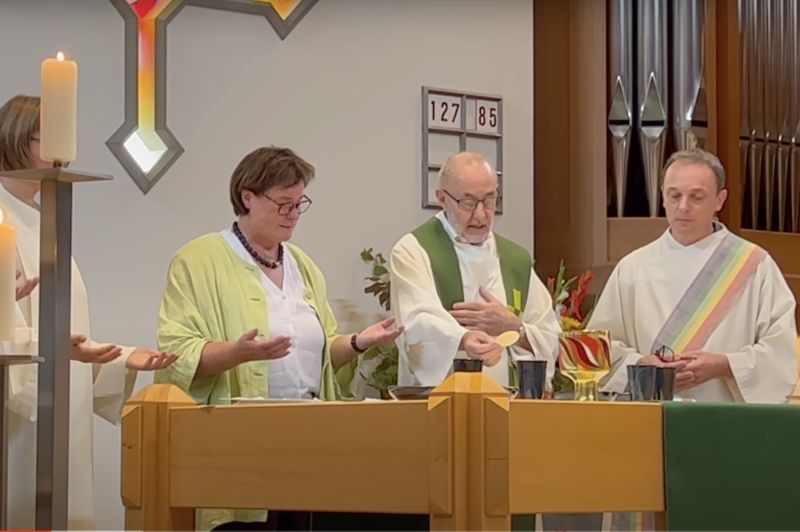
Swiss bishops call for respect for ‘rules’ after woman appears to concelebrate Mass
 The bishops’ call for adherence to Catholic “rules” follows an internet controversy over a August 2022 video of a laywoman who seemed to concelebrate Mass with priests. / Katholisches Medienzentrum YouTube screenshot
The bishops’ call for adherence to Catholic “rules” follows an internet controversy over a August 2022 video of a laywoman who seemed to concelebrate Mass with priests. / Katholisches Medienzentrum YouTube screenshot
Denver, Colo., Jan 12, 2023 / 10:10 am (CNA).
Only ordained priests may preside at Mass, and the liturgy should not be “a testing ground for personal projects,” three Swiss bishops have said. Their intervention follows internet controversy over a video of a laywoman who seemed to concelebrate Mass with priests.
“You all know that only the priest validly presides at the Eucharist, grants sacramental reconciliation, and anoints the sick. This is precisely why he is ordained. This rule of the Roman Catholic faith must be respected without restriction in our dioceses,” Bishops Joseph Bonnemain of Chur, Felix Gmür of Basel, and Markus Büchel of Sankt Gallen said in a Jan. 5 letter to people active in pastoral care, the French Catholic newspaper La Croix reported.
Their three dioceses are the predominantly German-speaking dioceses of Switzerland.
The bishops acknowledged people’s desire to participate in the liturgy but said the Catholic liturgy has a universal character, and this especially concerns celebrations of the sacraments.
“Common witness requires common forms and rules. We bishops regularly receive requests and worried reactions: the faithful have a right to religious services that respect the rules and forms of the Church,” their letter said.
Their letter came after controversy over an August 2022 Mass in the Diocese of Chur at which a longtime de facto parish administrator, Zurich resident Monika Schmid, appeared to concelebrate the Eucharist to mark her retirement.
Bishop Bonnemain quickly opened a preliminary canonical investigation into the action on the grounds of alleged liturgical abuse. Canon 907 of the Catholic Church’s canon law bars Catholic deacons and Catholic laity from offering the eucharistic prayer and from performing actions “proper to the celebrating priest.”
Schmid has denied her actions constituted an attempt to concelebrate Mass or to be provocative, the Swiss Catholic internet news portal Cath.ch reported. Schmid acknowledged that as a woman she can’t validly celebrate the Eucharist as ordained Catholic priests do. She said the controversy was based on a video clip uploaded to the internet without the knowledge of all the participants.
“And some are already seeing red when they see a woman at the altar in a photo,” she said.
According to Cath.ch, the video of the Mass “clearly shows her, in civilian clothes, at the altar, surrounded by two priests and pronouncing with them, extending her arms, the text of the consecration of bread and wine and of the eucharistic prayer.”
The text of the eucharistic prayer had been “extensively revised,” La Croix reported in September.
In their letter, the bishops of German-speaking Switzerland said they are aware that some have argued that women participate in the liturgy.
“We hear the requests of many people to be able to participate in the liturgy in other ways, for example as women,” they said. “However, we urge you to not make the sign of unity that is the liturgy into a testing ground for personal projects. It is precisely in the worldwide celebration of the same liturgy that we are Catholic and in solidarity with one another.”
The bishops rejected any claim that they were defending “patriarchal clericalism.” Rather, they said, “priests, in the service and execution of the sacraments, make visible that Jesus Christ himself acts in and through the sacraments.” Priests “keep open, as it were, space for God’s action in the liturgy.”
Schmid, the pastoral worker whose retirement Mass sparked the controversy, was critical of the bishops’ letter. She advocated a liturgical celebration that, in her view, “reaches out to people in their daily lives, in their language and in their understanding of themselves,” Cath.ch reported.
The bishops referred to Pope Francis’ June 2022 apostolic letter Desiderio desideravi. It insists on the quality of liturgies, the careful attention to every aspect of liturgical celebration, and the observance of every rubric.
According to La Croix, the German bishops invited Catholics to use “the diversity of forms for liturgical celebrations that the Church offers … and to use places in the liturgy, such as reflection, preaching, meditation, intercessions, songs, music, and silence, so that you can be part of it personally.”

